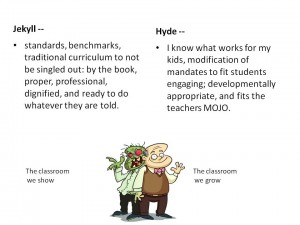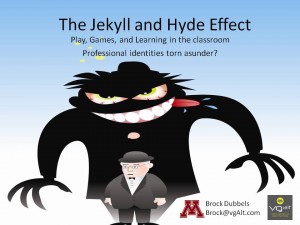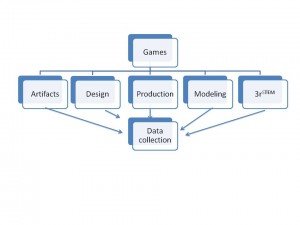The Jekyll and Hyde Effect calls into question approaches to accountability and implementation of mandated approaches to research-validated techniques and assessment in classroom instruction. Dissonance between teachers core beliefs about student learning and these new mandates, as presented to them, may be creating two different identities, two different classrooms, and two different sets of books to satisfy mandates and continue doing what they know works. This study utilized discourse analysis, coding teacher artifacts as outcomes of genre chains with themes from mandates, policy, and law for classroom changes in curriculum and instructional assessment tools, materials, and professional development. The informants from the studies and findings from analysis of the artifacts reveal that many teachers do not feel that what is good for the spreadsheet is good for kids. This tension in core beliefs about learning and instruction need not lead to conflict– integration of assessment and appropriate implementation could enhance teacher and student experience. The transformation of policy to implementation was seen as problematic and led to misunderstanding and conflict, often based upon an inability to see standards, benchmarks, and assessments integrated into engaging, play-like activities such as games rather than the controlled, direct instruction that might cause resistance and disinterest by students and instructors, but easy to identify by administrators. The presentation makes a case for the importance of play in engagement and comprehension through review of literature on intelligence measures and new research on embodiment theory and the indexical hypothesis. Then it give examples of implementation.
New models of comprehension and memory validate the value of active and playful learning for cognitive enhancement and generative transfer. Data on academic performance and engagement measures from five years of games, play, and virtual space learning in K-20 classrooms will be presented in the context of assessment measures using a model for assessing cognitive growth. This is contrasted with educator beliefs, the efficacy of play, and the limitations of models of teacher professionalism creating a Jekyll and Hyde Effect. Though interviews, artifacts, and surveys, K-20 educators have expressed a willingness to embrace games, but have been reluctant to do so publicly for fear of professional reputation, as well as the ability to implement such pedagogical change.
In this presentation, on overview of research, methodology, outcomes, and descriptions of implementation will be presented on how video games and virtual worlds were used to raise standardized reading scores. This evidence, methodology, and experience is presented with outcomes of surveys, interviews, and discourse analysis of teacher artifacts, and presents the institutional experiences of educators balancing the tension of using games and play, and the fear of being stigmatized as unprofessional at their teaching sites. The result begins to create a picture of creating two different sets of books, and two different teaching identities — Jeckyll and Hyde.

Schools Get in the Game
Ok, it’s time to submit your school reports. Did everyone play Mario Kart at the weekend? Good. Let’s begin with group discussion, what is the games premise and objective?
This may sound a little strange but for one Minneapolis teacher video games have become learning tools for his class of sixth to eighth graders. Brock Dubbels of Seward Montessori in Minneapolis designed his ‘Video Games as Learning Tools’ class to span a three week period. Requiring children to create detailed multimedia presentations from video games played in groups. He explains that the children are not just learning from the games content but also gaining key skills from playing and studying the games. Dubbels, who has a background in cognitive psychology, goes on to say “It connects to their lives, research shows that children want to perform where they have competence.†Brock Dubbels will be spreading the word throughout the summer period with training seminars and online courses designed to show other teachers how his three week course works.
The children split up into groups and play video games. They will take notes whilst playing, with the goal being to explain how the game is played, how a player might win and how the game is designed. It is said to be a modern version of a book report. But is this new take on the rising popularity of video games a healthy and positive attitude? Or will it just teach children that they can just goof around playing video games and call it learning?
This course is an online introduction to Video Games as Learning Tools, a comprehensive course based upon five years of implementation and research. The course builds from three concepts:
- Deep Learning
- Games
- Motivation
The course offers innovative ways to learn and connect engaging instructional strategies, research, and resources for educators, instructional designers, game makers, and people with an interest in games and learning. The course is built from an instructional framework that lists five ways that games can be used for instruction (figure 1).
The course provides an overview of games, and how they can be used as:
- artifacts and texts for study and instruction
- as guidelines for designing instruction (to utilize game design concepts for classrooms, training, and professional development), as well as curriculum tools for content delivery.
- as a means for producing new media and new narratives such as machinima, modding (modifying of the shelf games into new games.
- as models, representation, simulations, and the study of virtual worlds
- and as a portal to developing 3rSTEM, an approach for teaching reading, writing, SCIENCE, TECHNOLOGY, ENGINEERING, and MATHEMATICS
This framework is intended to offer a range of experiences for a variety of learners and familiarity with games, as well as purposes and objectives. The introductory course offers beginners a range of experiences for developing comfort and competence, as well as approaches to using games for instructional purposes, and it offers game enthusiasts and game designers opportunity to gain introduction to research, learning theories, and design techniques.
The course was designed to be self-paced, allow the learner choice and opportunity to choose outcomes and learning purpose, and provide resources and community.
The course has been offered for four years at the University of Minnesota graduate school in the College of Education and Human Development, and embodies accessibility and quality.
Take a look at some comments and recommendations on my Linked in page
The course is available online through the Professional Learning Board in conjunction with Minneapolis Public Schools Alternative Teacher Professional Pay System and the University of Minnesota.
Sign up by clicking the space invader.
 Video Games as Learning Tools
Video Games as Learning Tools
Students interested in graduate credits may purchase three 5000 level graduate credits for half the normal price.
If you email the instructor, coupon codes are available for Minneapolis Public School Teachers and the first 10 Non-MPS students









